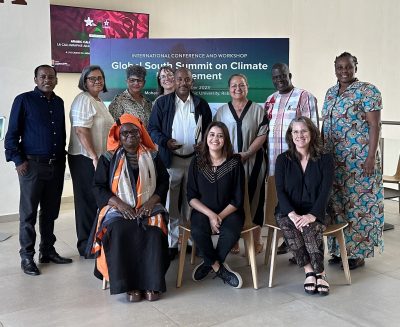IDRC Research Chairs call for an end to the silos that divide climate change policy from displacement solutions.

Back Row: A. Girmachew Zewdu (Ethiopia), Desiree Del Rosario (Chair, Dominican Republic), Sheila Martinez (Dominican Republic), Heather Alexander (Canada), Abebaw Minaye (Chair, Ethiopia), Roula El-Rifai (IDRC), T. Alain Ouedraogo (Chair, Burkina Faso), Opportuna Kweka (Chair, Tanzania); Front Row: Ramata Thioune (IDRC), Amal El Ouassif (Chair, Morocco), Caroline Ford (IDRC). Not shown: Paula Banerjee (Chair, Thailand) and James Milner (Canada)
Following their inaugural workshop in Dar es-Salaam in May, five of the IDRC Research Chairs on Forced Displacement (Desiree Del Rosario, Abebaw Minaye, Tiga Alain Ouedraogo, Opportuna Kweka, Amal El Ouassif, and Paula Banerjee) gathered to discuss the crisis of climate displacement from a Global South perspective. The forum was an informal workshop held on the margins of the Global South Summit on Climate Displacement at Mohammed VI Polytechnic University in Rabat, Morocco from 1-3 November. The debate was urgent and spirit. At stake, the need for new approaches to climate displacement.
The lively debate touched on issues as diverse as framing and terminology to the environmental impact of refugee camps. The result was a list of policy recommendations for governments and the international community, including the pressing need to mainstream climate change and the environment throughout all forced displacement policy, while also mainstreaming forced displacement into every aspect of climate change policy, breaking down the silos that impede holistic solutions.
One theme that emerged from the debate was the need to keep the focus on the inherent dignity of people and the responsibility of governments to be transparent and to protect both their own citizens, but also migrants and displaced persons. The Chairs noted that many best practices can be found not only in the practices of some governments, but in the knowledge and expertise of displaced persons, refugees, indigenous communities, and nomadic pastoralists, who often know best how to balance human activity and conservation. The discussion stressed the need for localized and local responses that are tailored to each community; what works best in a refugee camp in Tanzania might not work in an urban setting in Ethiopia. Finally, Chairs highlighted the specific issue of access to data on climate displacement, and the need to better incorporate climate displacement data into development indices.
Results and recommendations from the Workshop will be presented at the Global Refugee Forum in Geneva in December, and the Network will propose a plan of action for climate change conferences, to ensure that displacement remains a major focus of the global climate change agenda.
Climate Call to Action:
Together, we acknowledge the deeply interconnected and interdependent nature of the nexus between climate change and forced displacement.
Building on existing Global South agreements, tools, fora and knowledge; Adopting and endorsing the conclusions of the Global South Summit on Climate Displacement, held by the research chair at Mohammad VI Polytechnic University in Rabat from 1-3 November 2023; Seeking to draw on best practices from the Global South, we urge governments, international organizations and the international community to commit to:
1. Ensure that responses to climate and environmental displacement are localized, situational and country specific;
2. Encourage the comprehensive management of environmental displacement policies including the governance of natural resources, disaster response, migration and forced displacement;
3. Integrate local perspectives (refugees, host communities, migrants, displaced and stateless persons) at every level and stage of national adaptation and mitigation policymaking;
4. Centre decolonial and indigenous knowledge and practices in climate displacement and environmental policy (including natural resource and land use), and place indigenous expertise at the forefront of climate solutions.
5. Integrate considerations of race, gender, and diverse identity intersections with climate change and displacement;
6. Foster a positive narrative around climate displaced persons and host communities;
7. Promote collaboration and mechanisms for partnership among State actors, civil society, private sector and impacted individuals;
8. Capitalize on regional integration mechanisms to encourage regional solutions;
9. Promote South-South platforms on climate displacement at national, regional, and global levels for learning, coordination, and best practices;
10. Ensure that research, data and statistics on the nexus between climate and displacement are publicly available, and incorporate climate change impact analyses in all research and publications.